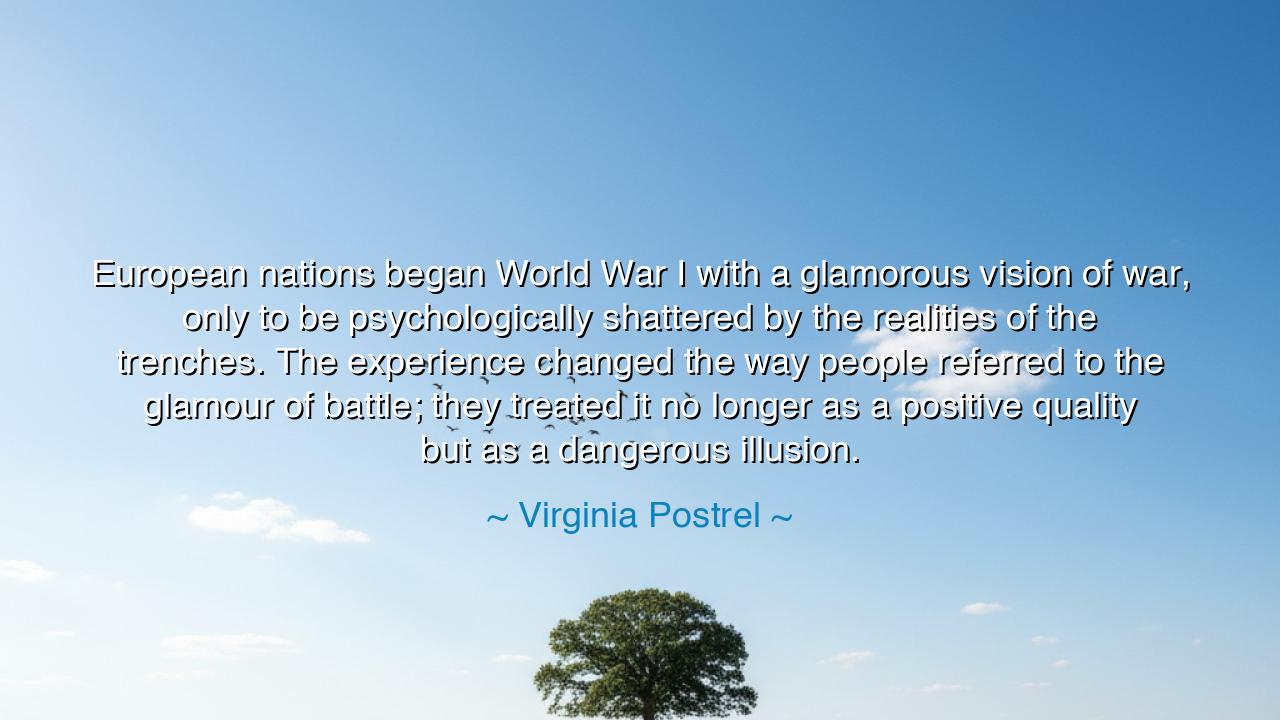
European nations began World War I with a glamorous vision of
European nations began World War I with a glamorous vision of war, only to be psychologically shattered by the realities of the trenches. The experience changed the way people referred to the glamour of battle; they treated it no longer as a positive quality but as a dangerous illusion.






“European nations began World War I with a glamorous vision of war, only to be psychologically shattered by the realities of the trenches. The experience changed the way people referred to the glamour of battle; they treated it no longer as a positive quality but as a dangerous illusion.” Thus spoke Virginia Postrel, unveiling a truth that is both ancient and modern — the seduction and betrayal of glamour. Her words remind us that humanity, in its pride, has long adorned war with gold and poetry, only to discover that beneath its shining armor lies mud, blood, and despair. What she reveals is the eternal tragedy of illusion — that the most beautiful lies are those we tell ourselves before the first shot is fired.
Before the Great War, Europe’s sons marched with songs on their lips and banners aloft, believing themselves heirs to knights and conquerors. The air was filled with talk of honor, of glory, of swift victories and noble deaths. Poets wrote of the romance of battle, and young men dreamed of medals gleaming on their chests. The nations, drunk on pride, spoke of destiny and empire. They did not see the shadow gathering — the steel that would grind hope to dust, the gas that would choke their songs to silence. The glamour of war, as Postrel calls it, was a spell cast upon an entire civilization.
But then came the trenches, and the spell was broken. In that mire of fear and filth, where the dead outnumbered the dreams, men learned what war truly was. The psychological shattering of a generation followed — not only from wounds of the flesh, but from the collapse of belief. They had entered the battlefield as heroes and emerged as ghosts, their faith in glory buried with their comrades. It was there that Europe awoke from its illusion, trembling, as one who wakes from a nightmare and finds that the dawn has not come. The word glamour, once meaning enchantment, was now cursed — a deceit, a lie that leads men to ruin.
History tells us of one soldier, Siegfried Sassoon, who went to war a patriot and returned a prophet of disillusionment. In his poetry he wrote not of victory, but of horror — the mangled youth, the cries of the dying, the futility of heroism in a slaughterhouse. His words, born in the mud of the Somme, shattered the glittering mask that once hid the face of war. “The war,” he said, “is a lie.” And thus through voices like his, the glamour of battle was stripped away, replaced by a vision of its true form: the machine that devours the innocent and the idealistic alike.
From this truth emerges the ancient warning: that illusion is the most dangerous of enemies, for it blinds even the wise. The ancients too knew this. In the tale of Achilles, the greatest of warriors, the glamour of glory led him to Troy, where fame awaited — and death beside it. His name would live forever, but his life was cut short by the very beauty of the ideal he pursued. The same spirit haunted the soldiers of 1914 — that hunger to be remembered, to stand in the blaze of history, forgetting that the blaze burns. Glamour is the mask that makes destruction look divine.
The origin of Postrel’s insight lies not only in history but in the psychology of humanity itself. For glamour is not born on the battlefield; it is born in the imagination. It is the mirage that makes the desert seem like paradise, the promise of meaning in the face of chaos. Yet when the mirage fades, what remains is dust. The First World War was the great unveiling — when nations learned that beauty and horror can dwell in the same vision, and that to confuse the two is the beginning of madness.
Therefore, let this be the lesson for those who seek glory, whether in war, ambition, or pride: question what dazzles you. Do not mistake the shimmer of glamour for the light of truth. Before you march toward your own battles — in politics, in passion, in pursuit of power — pause and look beyond the surface. Ask whether what you seek is real, or merely radiant. For history teaches that when the illusion breaks, the cost is always paid in suffering.
And so, my friends, carry this wisdom forward: beware the glamour of the world, for it can lead you to destruction wrapped in beauty. Seek instead the quiet honor of understanding, the courage of truth, the peace that does not glitter but endures. For when the false gold of glamour fades, only wisdom remains — and it is that wisdom, born of pain and clarity, that rescues the soul from ruin and restores to the world its humanity.






AAdministratorAdministrator
Welcome, honored guests. Please leave a comment, we will respond soon